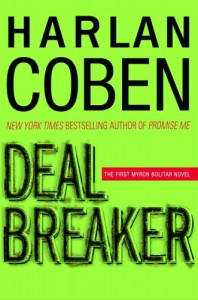Deal Breaker (Myron Bolitar Mysteries)


We all classify and judge; every review written here is a form of classification. Binaries are bit more emphatic. You're in or you're out; you're good or you're bad. I enjoy David's binaries, though some were not included in the chart to keep the peace :). David's binaries came to mind when I thought of the 15 BOOKS I read by Harlan Coben during my book wallow. And by the way, this review provides considerable bang for the buck, as it treats 15 books in one review.
The six stand-alone books can summarized pretty easily: someone is missing. These are the six I read:
1. Caught
2. Darkest Fear
3. Hold Tight
4. The Innocent
5. No Second Chance
6. The Woods
However, the 9 books that comprise the Myron Bolitar series prompted a binary of my own: Mysteries solved by deduction vs. Mysteries solved or "settled" by characters possessing unbelievable physical or intellectual powers. In the tradition of binaries, the qualities on the left are superior. Thus, mysteries solved by hard work/sound deduction tend to be considerably more interesting. The Sherlock Holmes mysteries would fall in this category. Just why mysteries solved by sound deduction would be superior seems evident. Extraordinary powers are a bit of cop out.
Stieg Larsson's Lisbeth Salander, a mathematical/computer genius with a photographic memory and the ability to annihilate anyone in her path easily qualifies as a character possessing unbelievable intellectual and physical powers. In the Myron Bolitar series, Winston Home Lockwood III, otherwise known as "Win," does the heavy lifting. I've never been able to picture this character - given the contrast of his ostensibly weak appearance and his supposed chick magnet good looks. Though bullied as a boy, Win used his vast wealth to study various martial arts since the age of seven, and is now a sixth-degree black belt. He's described as the "quintessential WASP" whose appearance reeks of "arrogance, elitism, Town and Country Parties Page, debutantes", etc. Like Lisbeth Salander, Win's appearance belies his lethal powers and quickness. Due to his wealth and connections, Win can also acquire information in seconds and manages, at any hint of danger, to be at Myron's side almost instantaneously. Having help like Win around does seem to stack the deck.
Chronologically, the 9 books in Myron Bolitar series are as follows:
1. Deal Breaker
2. Drop Shot
3. Fade Away
4. Backspin
5. One False Move
6. The Final Detail
7. The Darkest Fear
8. Promise Me
9. Long Lost
With the exception of one book, where things do go awry, there's not much suspense in this series, because we know Myron - enhanced by Win and a couple more superpowers in his office - is going to succeed. Coben maintains what interest is maintained in this series by his quirky characters. There's Win who, in addition to being handsome, wealthy, and physically unbeatable, tends to go out nocturnal trips to exterminate (literally) some bad guys when things get too tedious at the office.
Myron Bolitar, who had been drafted in the Celtics' first round, only to blow out a knee in a preseason game, has a medley of quirks. He lived with his parents (in a basement room) until his early thirties, not because he had to, but because he liked their company. After losing his chance to play pro basketball, Myron went to Harvard Law, worked as an FBI agent for a while and used his degree to become a sports agent. He drinks Yoo-Hoo's and has the bad habit of boinking more than one of the female leads at a time.
His two office assistants are former women wrestlers, and well, you get the idea. There is a stock of likable characters, each with a shtick, who get trotted out in each book. Coben's books are mild entertainment.
Though Stieg Larsson's trilogy is considerably better, too often problems are solved and bad guys are neutered by sensational means. Centuries earlier, Aristotle, in describing the essentials of a good plot, explained how an audience can be surprised but, in looking back will see that the events emerged logically. "Super" characters function a bit like the Deus ex machina device used incorrectly. They mete out justice artificially. The plot gets wrapped up, rather than unfolding - intelligently and logically.




